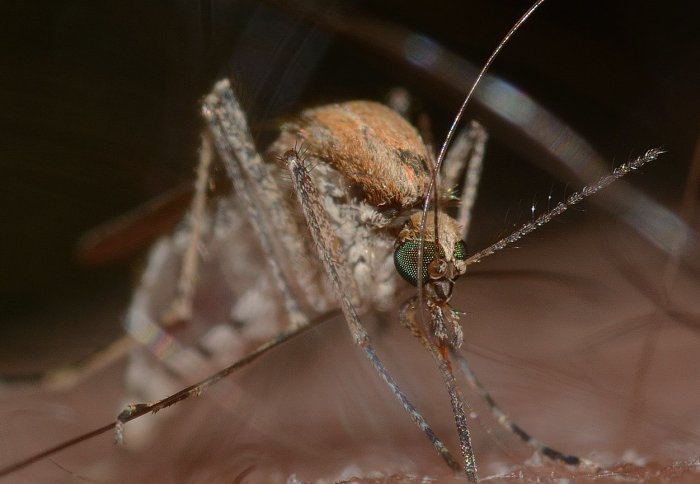

Dr Abigail Culshaw is a Research Associate in the Department of Medicine, and discussed the dengue epidemic at this year's Imperial Festival.
What is dengue fever and why have we started to hear more about it recently in the media?
Dengue fever is a virus, and it’s transmitted via the bite of an infected mosquito. That mosquito needs quite warm conditions to live, so you’ll find it in tropical and sub-tropical places.
One of the main reasons that we’re hearing more about it at the moment is because of the Zika virus. Zika and dengue are in the same family; they’re related. They look very similar, and they’re made of similar proteins. Everyone thought that Zika was quite a mild infection. Dengue can be quite serious; you can get something called haemorrhagic fever. This basically means that your blood volume is not enough to get oxygen to your vital organs, and you can then go into shock. However, Zika doesn’t do that; you get milder symptoms such as a fever or an eye infection. However, it does cause these quite serious complications for babies, and that’s why we’ve been hearing more about these viruses in the media.
Has the link between dengue and Zika been scientifically proven yet, or is it just based on observation at this stage?
Right now, it’s based on observation. However, there’s work going on to look at immune responses to dengue and to see if it can cross-react with Zika. The immune response to the previous infection of dengue is potentially one of the mechanisms that can make you more susceptible to Zika. It’s definitely not been 100% proven yet, but there’s a lot of work going on to investigate it. My feeling is that it makes sense that cross-reaction would happen, because dengue has four different serotypes, and they’re very closely related. We call it the same disease, but they are distinct genetically. It’s not good if you’ve got immunity to one, and you then get infected with another – that can make you more unwell. If you’ve got an immune response to the first serotype, for instance, then it means it’s actually working against you. I would not be surprised if that also happened with Zika as well, because it is quite closely related to dengue.
How much influence do you think the media has in terms of catalysing a response to these epidemics from researchers like you?
I would say a lot. The issue of microcephaly in babies is a big problem, and I definitely think that as a result of that being in the news, people are more likely to get funding to investigate it. It will also make it easier to get publications, because it’s something everyone has heard of. There are definitely trends in science, and the media will feed into that. The massive amount of HIV research that was being done in the 80s and 90s was definitely spurred on by the media.
Personally, I’m interested in working on something that has the potential to help individuals anywhere in the world – they don’t have to be my next-door-neighbour.
Dr Abigail Culshaw
Dengue fever has been a threat to public health in some Asian and Latin American countries for several decades. In recent years, there has been a scattering of reported cases in Europe and North America. Do you think that a more rapid response to health epidemics is generated when they begin to affect the Western world?
It’s hard to say. Certainly, there isn’t that much research going on in this country into dengue. However, science is a global community. There is the potential for researchers from around the world to come here and work on the problems that are affecting their home countries. People often get into science for quite personal reasons, and research the things that have had a direct effect on them. I would agree that the hope for resolving under-reported epidemics lies in this collaborative, global network of research. Ebola hit resource-poor nations, and still received a lot of media attention; this resulted in people rushing through vaccines that weren’t necessarily right. The thing with infectious diseases is that they have no borders; they could spread globally. Personally, I’m interested in working on something that has the potential to help individuals anywhere in the world – they don’t have to be my next-door-neighbour.
What are the immediate questions about dengue fever that need to be answered?
There’s this connection between having an immune response and potentially getting sicker. One of the most important questions is: what is it about an immune response that is going to predispose you to getting more unwell? This feeds into effective design of a vaccine. A vaccine promotes an immune response, so you don’t want to worsen someone’s condition. There are quite advanced clinical trials; there is a vaccine that has just been licenced for people aged 9-45 by Sanofi Pasteur. There is some evidence that it was making children younger than 9 years of age more ill. We need to understand why it’s working in one age group, and not the other.
There are also questions around vector controls, and how we limit the spread of the disease via the infected mosquito; there’s a lot of research going into that. There is also a lot of interest around why it is that some people can contract the virus and then get better, but some people continue to get a lot worse. There are people looking at that window during the timeframe of the infection, and working out what is different about the people who go on to become really sick, and also how you can manage those factors within a hospital situation.
How does dengue fever fit into your research interests?
I started out working on HIV, and looking at a particular cell type from the immune system – they’re sometimes referred to as killer T cells. Viruses need to be inside your cells to survive, and killer T cells can recognise when a cell is infected and kill it. That was the focus of my PhD. Now I’ve moved on to looking at specific cells, in the context of dengue virus infection, and how it feeds into this story of how the immune system can make you more unwell. These killer T cells aren’t always beneficial.
Why do you think it’s important to discuss your research at an event like Imperial Festival?
It makes you think about your research in a different way. You can become really bogged down in the details of it, but if you have to explain it to people who don’t have the same level of knowledge as you do on your subject, it makes you think about the really important questions.
Article text (excluding photos or graphics) available under an Attribution-NonCommercial-ShareAlike Creative Commons license.
Photos and graphics subject to third party copyright used with permission or © Imperial College London.
Reporter

Ms Genevieve Timmins
Academic Services

Contact details
Email: g.timmins@imperial.ac.uk
Show all stories by this author




Leave a comment
Your comment may be published, displaying your name as you provide it, unless you request otherwise. Your contact details will never be published.